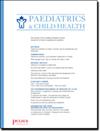81 A Snapshot of Entrustability of Acute Care Procedural Skills in Paediatrics Residents
IF 1.8
4区 医学
Q2 PEDIATRICS
引用次数: 0
Abstract
Abstract Background General paediatricians are expected to be competent in the resuscitation of children and important to this competency is the ability to perform certain acute care procedural skills. Paediatric residents are expected to be competent in these procedural skills by the end of their training as specified by the Royal College (RCPSC). However, the extent to which residents are actually competent is not fully assessed or understood. There are currently no evidence-supported guidelines suggesting the best path toward procedural skills competency for residents, and they are less likely to receive formal training and or supervision for completing procedural skills than their nursing counterparts. They also report feeling inadequately prepared. To address this gap, the Paediatrics program at McMaster University aimed to conduct a longitudinal cross-sectional study examining the competency of their trainees in specific acute care procedures. Objectives The purpose of this first study was to present a cross-sectional observation of the entrustability of paediatric residents in 6 procedural skills. Design/Methods The procedures were bag-valve mask (BVM) ventilation, intubation, intraosseous (IO) line insertion, chest tube insertion, and cardiopulmonary resuscitation (CPR), and defibrillation, which are all requirements of the RCPSC. Paediatric residents attended an “Acute Care Procedure Day” where they performed each procedure with direct observation and feedback. Entrustable professional activity (EPA) scores (from 1 to 5) were recorded for each attempt. Prior, a 1-hour interactive lecture was given that included procedural information and a video demonstration of each procedure. Residents received a copy of the milestones per EPA. Demographic information, self-perceived comfort, and EPA data were collected. Descriptive statistics and Pearson correlation for PGY level versus EPA scores were performed. Results Of the 36 residents who participated, 24(67%) were in postgraduate year (PGY) 1-2, and 12 PGY 3-4(33%). Reported levels of past experience were lowest for placement of chest tubes (n=3, 8.3%), followed by IOs (n=19, 52.8%). During the sessions, residents showed the highest levels of initial entrustment with IO placement (EPA 4-5 in 28/33), BVM skills (EPA 4-5 in 27/33), and CPR (EPA 4-5 in 16/25), and lowest for chest tube placement (EPA 4-5 in 0/35), defibrillation (EPA 4-5 in 5/31 residents) and intubation (EPA 4-5 in 17/31). Despite this, self-reported overall confidence after training for these procedures was moderate to high. There was strong correlation between PGY level and EPA score for intubation, and no correlation for the other procedures. Conclusion Our findings show that entrustability of certain acute care skills is not being obtained (i.e., defibrillation, chest tube placement), and that there were large discrepancies between entrustment scores and perceived comfort among the PGY levels. Further research is needed to characterize the learning curves for these skills, and their relative importance in paediatrics training.儿科住院医师急性护理程序技能的可信赖性快照
背景一般儿科医生被期望能够胜任儿童的复苏,重要的是这种能力是执行某些急性护理程序技能的能力。儿科住院医生预计在皇家学院(RCPSC)规定的培训结束时,能够胜任这些程序技能。然而,居民实际胜任的程度并没有得到充分的评估或了解。目前还没有证据支持的指导方针建议住院医生获得程序技能能力的最佳途径,他们比护理同行更不可能接受正式的培训或监督来完成程序技能。他们还表示感觉准备不足。为了解决这一差距,麦克马斯特大学的儿科项目旨在进行一项纵向横断面研究,检查他们的受训者在特定急性护理程序中的能力。第一项研究的目的是对儿科住院医生在6项程序技能方面的可信赖性进行横断面观察。设计/方法采用气囊式瓣膜面罩(BVM)通气、插管、骨内(IO)线插入、胸管插入、心肺复苏(CPR)和除颤,均符合RCPSC的要求。儿科住院医生参加了“急性护理程序日”,在那里他们在直接观察和反馈的情况下完成了每个程序。每次尝试都记录可信赖的专业活动(EPA)得分(从1到5)。在此之前,进行了1小时的互动讲座,包括程序信息和每个程序的视频演示。居民收到了EPA规定的里程碑副本。收集了人口统计信息、自我感知舒适度和EPA数据。对PGY水平与EPA评分进行描述性统计和Pearson相关性分析。结果36名住院医师中,研究生1-2年级24人(67%),研究生3-4年级12人(33%)。报告的既往经验水平最低的是放置胸管(n=3, 8.3%),其次是IOs (n=19, 52.8%)。在会议期间,住院医师对IO放置(28/33中EPA 4-5)、BVM技能(27/33中EPA 4-5)和CPR(16/25中EPA 4-5)的初始信任水平最高,对胸管放置(0/35中EPA 4-5)、除颤(5/31中EPA 4-5)和插管(17/31中EPA 4-5)的初始信任水平最低。尽管如此,这些程序训练后,自我报告的整体信心是中等到高的。插管时PGY水平与EPA评分有较强的相关性,其他手术无相关性。结论:我们的研究结果表明,某些急性护理技能(即除颤,胸管放置)的可信赖性尚未获得,并且在PGY水平中,可信赖评分与感知舒适度之间存在很大差异。需要进一步的研究来描述这些技能的学习曲线,以及它们在儿科培训中的相对重要性。
本文章由计算机程序翻译,如有差异,请以英文原文为准。
求助全文
约1分钟内获得全文
求助全文
来源期刊

Paediatrics & child health
医学-小儿科
CiteScore
2.10
自引率
5.30%
发文量
208
审稿时长
>12 weeks
期刊介绍:
Paediatrics & Child Health (PCH) is the official journal of the Canadian Paediatric Society, and the only peer-reviewed paediatric journal in Canada. Its mission is to advocate for the health and well-being of all Canadian children and youth and to educate child and youth health professionals across the country.
PCH reaches 8,000 paediatricians, family physicians and other child and youth health professionals, as well as ministers and officials in various levels of government who are involved with child and youth health policy in Canada.
 求助内容:
求助内容: 应助结果提醒方式:
应助结果提醒方式:


